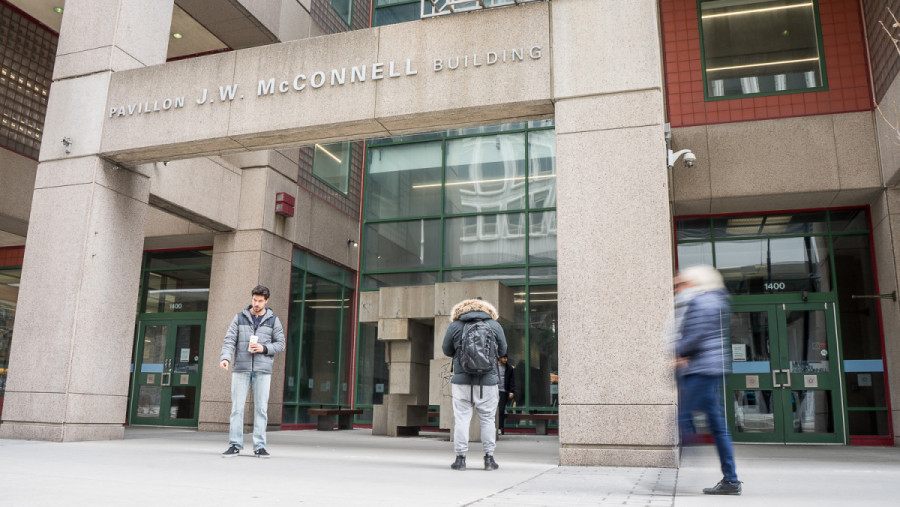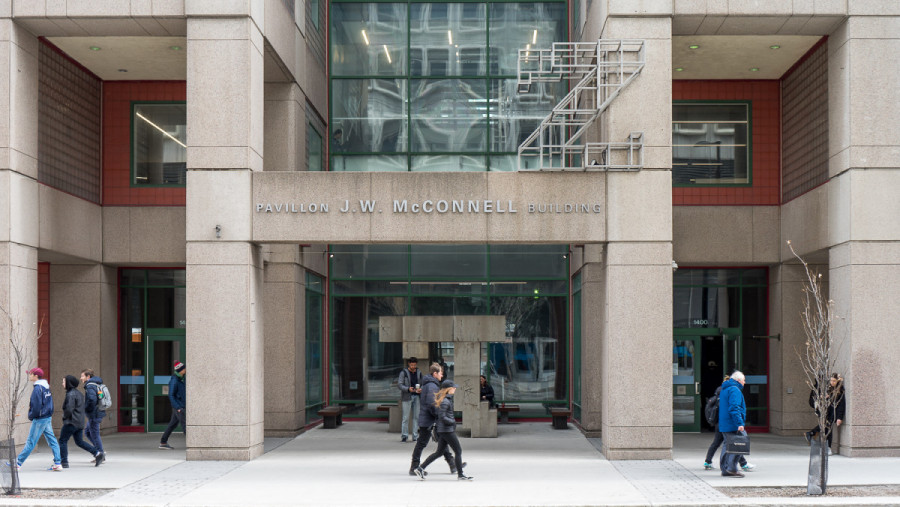Emotions run high at CSU town hall meeting, students exclaim “enough is enough”
Participants demand change while decrying the pitfalls of remote learning
Students closely huddled together through Zoom. Concerns were raised, complaints were shared and tears were shed as students in the arts and sciences faculty came together in community near the end of an arduous semester.
They were invited to an online town hall meeting organised by the Concordia Student Union and the Arts and Sciences Federation of Associations on Nov. 19. The town hall process was intended as a forum for students to raise concerns and issues that they have been having with remote learning at Concordia in the fall semester.
According to Nicole LeBlanc, one of the CSU organisers of the event, many of the issues faced by students in this context are faculty-specific. “[We] proposed this town hall process as well as a survey to each faculty association; ASFA and the Fine Arts Student Alliance both decided that a town hall would be useful for them,” LeBlanc explained.
Attendance was packed at 50 people, which was the highest turnout the CSU has had for an event since the pandemic began, according to one of the organisers.
The depth, intensity, and range of concerns expressed possibly explain the high-turnout. “The town-hall gave students a space to vent out their diverse, long-held frustrations with the Concordia administration,” said Martín Lazos Bobadilla, one of the students present.
LeBlanc said the event was extremely beneficial, and she was impressed by the engagement that took place between students.
“We have gained lots of useful feedback that helps us better understand these issues,” added LeBlanc.
The CSU recorded all of the complaints, and plans to take them to the administration, she said.
Students express concerns about tuition
One of the main concerns raised was students paying the same amount of tuition, even while they’re not using the university’s facilities. The breakdown of the university’s expenditures, when it comes to its compulsory fees, isn’t accessible anywhere online. CSU General Coordinator Isaiah Joyner has asked the university for this breakdown. It would include where each fee goes, which departments receive them, and how they use them.
He requested the breakdown last month—Concordia’s Students Accounts Office said they’re looking into it, but haven’t given it to him yet.
Joyner said that he ‘isn’t too satisfied with how long it’s taking [...] Students should know exactly where all the fees go to at any given point.”
_900_600_90.jpg)
Bobadilla, one of the most vocal students at the town hall meeting, thinks students should be extremely skeptical about how the university is spending its money.
“I don’t even think that the university is spending our money justly—why else wouldn’t they be transparent about their spending?” Bobadilla said. “I think one of the main demands—which should be the CSU’s demands as well—is that we should have a say in what our money is being spent on. This is impossible if we can’t actually see the breakdown.”
Many students expressed that they experienced significant financial difficulties during the pandemic. Several also called for tuition costs to be reduced.
Mental health and workload also a concern
Many students also expressed that they’ve seen an increased workload and professors have been inconsiderate.
“I don’t have time for myself,” said Christiane Sakr, a fourth-year sociology student. “I’m constantly working on an assignment. I’ve never been this overwhelmed with school work.”
On top of the workload, other facets of the semester have negatively impacted her mental health. Sakr mentioned that being away from her friends has made her feel isolated. Even though they still talk every day, it's different not being able to see them in person.
“I have to deal with poor internet connection. [...] I also don’t like how I'm constantly staring at a screen. It's bad for my eyes. Sitting down for too long is bad for my back. In general, the experience is taking a big toll on my physical health,” she said about the technological aspect of learning and its negative consequences.
Both Sakr and Bobadilla feel the university isn’t giving students adequate mental health resources.
“Mental health has always been a huge issue in the Concordia student body, but the pandemic has exacerbated it massively,” said Bobadilla. “I, myself, have tried to make use of services several times, and it would be months and months before I got one appointment.”
Bobadilla sees this as relative to the issue of the fee breakdown—students are supposed to be paying for mental health services, but the university doesn’t seem to be placing its funding on these things, they said. Seeing the breakdown is imperative to see if the students’ money is actually going towards students interests, they said.
“I felt like I was on my knees, begging them for crumbs. International students are being mistreated.” — Martín Lazos Bobadilla
"International students are being mistreated"
International students present at the meeting, as well as friends of international students, said a lot of the previous issues resonate to a greater extent for international students.
Many international students find it impossible to lessen their workload because, in order to maintain their legal status in Canada, they need to be a full-time student—which means they have to be enrolled in four courses in all semesters.
Some international students also mentioned how they’re forced to attend live lectures, and, because of time-zone differences, have to go days without seeing the sun.
On top of this, international students still pay higher tuition than domestic students. “It makes no sense that we’re paying tens of thousands of dollars for online classes,” said Bobadilla, an international student themselves.
Bobadilla mentioned that they faced significant financial difficulties at the start of the pandemic. They couldn’t apply for the Canada Emergency Response Benefit because they hadn’t worked in Montreal the previous year, and as an international student they were ineligible for the Canada Emergency Student Benefit.
The financial support that the university was offering international students at this time was inadequate, they said.
“The university gave a stipend of $10,000 for the entire international student body. I applied for it and they gave me around $450. They made it very clear that this was the highest amount that they could possibly give me. If you do the math, that means that only 22 international students received a mere 450 dollars.” They said.
The amount isn’t enough to help students deal with the high costs of food, rent and general living expenses in Montreal, Bobadilla added. “I felt like I was on my knees, begging them for crumbs,” they said. “International students are being mistreated.”
Bobadilla mentions they eventually had to leave the country and return to their family because they couldn’t afford to live in Montreal anymore.
“I didn’t have enough money to pay rent or to feed myself [...] I was lucky to have a place to go back to. But this may not be possible for many international students, who may have abusive family lives or unstable situations in their home countries,” they said.

International students are also being failed by the mental health services, said Sakr. She is a Canadian citizen, but as someone with Middle Eastern ancestry, she said she’s dismayed by the lack of diversity amongst psychologists on campus. A majority are culturally insensitive white Canadians, she said.
As someone with ADHD, she said that mental health and learning disabilities are unfortunately stigmatized and aren’t discussed in her culture. This makes it harder for students to get diagnosed earlier on.
When she saw a Concordia psychologist about her symptoms, she said he dismissed them as depression, and told her to ‘go for a walk.’ She ultimately received a diagnosis from a neurologist outside of the university.
Because of the lack of diversity, some psychologists are unable to “grasp the challenges and barriers that many international students face.” She said.
“It's a disservice to the student demographic that pays the highest tuition rate,” she said.
Next town hall meeting could see planning for collective action
The success of the meeting led to the CSU deciding to make them a weekly occurrence, according to Leblanc.
“We did not have enough time to talk about possible solutions to the issues brought up by students [...] that will most likely be a large part of the conversation this week and next.” She said.
If major issues aren’t addressed, one of their responses could be in the form of collective action, she said.
“It's really important that we start organizing and start discussing a plan of action,” said Bobadilla. “I don’t think the university is just going to improve conditions through us asking them nicely.”
Bobadilla thinks the university is primarily interested in their own profits, and so it's not in their interests to improve the academic experience.
“The only ways gains are actually made by working-class students, is by pressuring the administration. No one in power has ever just willingly granted privileges without massive pressure from below.” Bobadilla said.
They cited the 2012 student strike as an example, where students massively organized against tuition increases. “In the context of the pandemic, we need to do that now as well—enough is enough.”
Read more: Quebec’s Student Movements: A History
Some students at the town hall expressed that due to stress, they've experienced suicidal ideation.
“This proves that it's a life or death situation. It isn’t something to be joking around with. I’m convinced that the university doesn’t really care. They’d let half of us die if it means that the other half will be filled with students, because what they’re really interested in is keeping us enrolled and keeping us paying,” they said.




_600_375_s_c1.png)

